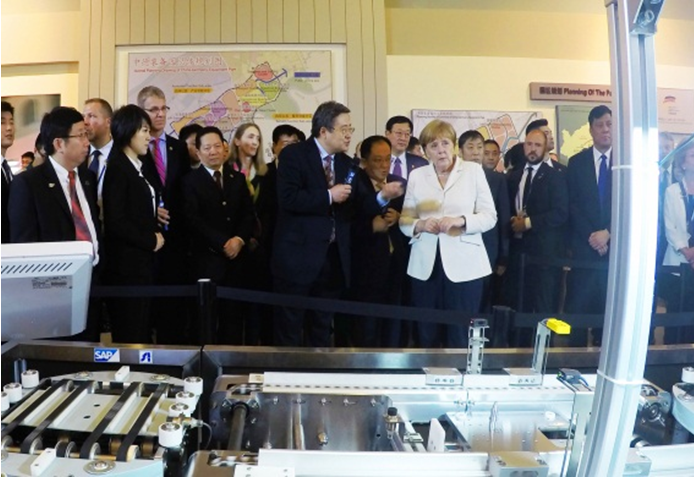

Germany’s Chancellor, Angela Merkel, visited University of Chinese Academy of Sciences (UCAS) on June 12, where she described Germany’s cooperation with China in science, the law and the economy as well as in diplomacy, which was followed by a Q&A session where she communicated with students from UCAS and Nanjing University.

German Chancellor Angela Merkel at the Industrial 4.0 Demonstration Line
Merkel went to UCAS directly after arriving at Capital Airport and was greeted by Bai Chunli, president of Chinese Academy of Sciences (CAS), who addressed the conference and said that CAS places great importance on its communications and cooperation with Germany in research and that it began cooperating with International Max Planck Research School (IMPRS) back in the 1970s, so it has a long history of cooperation in scientific research and education with Germany, through young scientist groups, round table conferences, introduction plan of scientific talents, and joint establishment of research institutes and laboratories.

German Chancellor Angela Merkel in UCAS. (Photo by Xinhua)
CAS also has partnerships with Germany’s main scientific research organizations, such as Fraunhofer-Gesellschaft, Helmholtz and Alexander von Humboldt-stifurg, as well as large enterprises, such as Bayer and Simens, and has seen the benefits of excellent cooperation.
Bai continued by saying that, in the new age, CAS is discussing cooperation models and key fields in new ways, such as a strategic cooperation seminar to be held later this year with IMPRS, and described how China’s and Germany’s science and education cooperation supplement each other so that the cooperation between the two has a good foundation and bright prospects. That cooperation, he said,will become better and better under China’s Belt and Road Initiative.
He concluded his talk by saying that Merkel’s visit is expected to encourage scholars and students in China and Germany to continue the cooperation and communications and the friendship in a more active way.
Merkel visited an industrial 4.0 demonstration production line developed by CAS’s Shenyang Institute of Automation and Germany’s SAP Co, on June 14, and showed great interest in it. Yu Haibin, head of the research institute, explained the idea behind the demonstration line and its applications and how it combines the institute’s and SAP’s technology to meet client demands and provide a new production mode for both mass and customized production. Yu described this as a classic example of Sino-German scientific and technological cooperation, combining the ‘Made in China 2025’ concept and the ‘German Industrial 4.0’ concept. Merkel asked some questions about the performance differences between a Siasun robot and a KUKA robot, with Yu providing the answers, to which Merkel expressed her appreciation.
SAP is the largest supplier of corporate management and coordinated commerce solutions in the world, the third largest software supplier in the world, and the second largest cloud company. The Shenyang Institute of Automation and SAP joint demonstration production line is the perfect combination of their respective intelligent manufacturing technology. The two say they will increase cooperation, connect technology, standards and marketing, establish an intelligent manufacturing standards system, and products that comply with both the ‘Made in China 2025’ and ‘German Industrial 4.0’ criteria, to develop intelligent manufacturing standards and solutions adapted to the current Chinese situation and boost enterprise digital and intelligent transformation.
Source: cas.cn